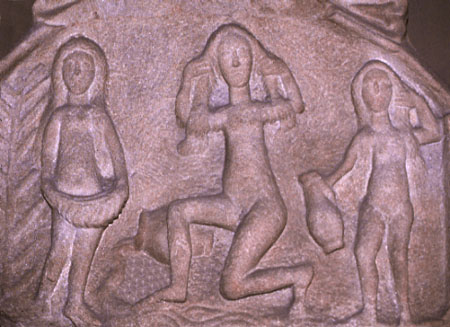Nymphs
From NovaRoma
(Difference between revisions)
(Undo revision 45602 by Special:Contributions/Marca Hortensia Maior (User talk:Marca Hortensia Maior)) |
|||
| Line 1: | Line 1: | ||
| − | Nymphs were native Italic water goddesses. The Latin term is ''lymphae'' but in inscriptions the Greek term ''nymphae'' was always used. | + | [[Category:Roman Gods]][[Image:Venus with Nymphs - Roman Celtic courtesy of Vroma.jpg|thumb|500px|right|[[Venus]] with Nymphs, Romano-Celtic.]] |
| + | Nymphs were native Italic water goddesses. The [[Latin]] term is ''lymphae'' but in inscriptions the Greek term ''nymphae'' was always used. | ||
| − | In Italy there were cults of fountains and springs. | + | In Italy there were cults of fountains and springs. Nymphs were associated with sources of fresh water, springs, grottos and especially with healing springs. The grotto alludes to a cthonic character and thus they had a divinatory aspect as well. |
| − | Nymphs were associated with sources of fresh water, springs, grottos and especially with healing springs. The grotto alludes to a cthonic character and thus they had a divinatory aspect as well. | + | |
| − | Famous nymphs are | + | Famous nymphs are [[Iuturna]], [[Furrina]], [[Egeria]], and the [[Camenae]] who were later assimilated to the Greek [[Muses]]. |
In Roman iconography nymphs are depicted as young women with shells or hydria. | In Roman iconography nymphs are depicted as young women with shells or hydria. | ||
| − | |||
| − | |||
| − | |||
| − | |||
| + | The native Italic deity [[Neptunus]] was also the god of fresh and running waters and there exist many inscriptions to Neptunus and the nymphae. | ||
==References== | ==References== | ||
*Larson "Nymphs" | *Larson "Nymphs" | ||
| − | *Green "Roman Religion and the Cult of Diana at Aricia" | + | *Green "Roman Religion and the Cult of Diana at Aricia" |
| − | + | ||
| − | + | ||
Latest revision as of 18:22, 20 November 2012

Venus with Nymphs, Romano-Celtic.
Nymphs were native Italic water goddesses. The Latin term is lymphae but in inscriptions the Greek term nymphae was always used.
In Italy there were cults of fountains and springs. Nymphs were associated with sources of fresh water, springs, grottos and especially with healing springs. The grotto alludes to a cthonic character and thus they had a divinatory aspect as well.
Famous nymphs are Iuturna, Furrina, Egeria, and the Camenae who were later assimilated to the Greek Muses.
In Roman iconography nymphs are depicted as young women with shells or hydria.
The native Italic deity Neptunus was also the god of fresh and running waters and there exist many inscriptions to Neptunus and the nymphae.
References
- Larson "Nymphs"
- Green "Roman Religion and the Cult of Diana at Aricia"